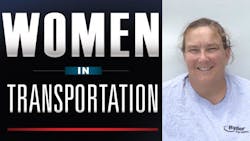Kimberly Brooks has been driving a truck since 1999. She’s seen a lot throughout her career, so she thought she was prepared for anything. That was until she drove as a contractor in Iraq for three years while serving as a logistics specialist in the Army.
“That was totally a culture shock,” Brooks told Fleet Owner. “I thought I could prepare for anything, but that was a whole different world.”
During her time in Iraq, Brooks drove “outside the wire” and off the military base in the public eye. And though she drove in convoys, accompanied by military escorts, that didn’t stop the reaction she would get from the locals.
“Women over there do not drive,” she explained. “We have a lot of luxuries and freedoms here in the U.S. that the women over there do not have. The response when they saw a woman driver was they would look and then look again like ‘what,’ and you could see the reaction on their faces. They were not used to seeing women in a dominant position of driving.”
“One time we were coming up over a bridge and there was a guy in a pickup, and his sheep was sitting in the front seat and his wife was sitting in the back of the bed of the pickup,” she recalled. “It was 100-plus degrees out, and she’s outside while the animal is sitting in the front seat. In the military, you get used to seeing a lot of things, but I couldn’t believe that.”
Brooks spent a total of 17 years in the Army Reserve. Now she works hauling oil-field equipment for Ryder and has been with the company since December 2014. She attended driving school in May 1999 and started her career in trucking that same year. She tried taking a short break from truck driving and worked as a nanny, but it didn’t work out.
“I tried to get away from the trucking industry for a little bit, but it always comes back to driving a truck,” she said with a laugh.
Brooks grew up in a small, rural farming community in Iowa. When she was a kid, she used to watch the show B.J. and the Bear, which aired in the 1970s and ’80s when the CB radio and the cultural infatuation with all things trucking peaked in the U.S. That’s when she became smitten with the idea of trucking and traveling.
“[The show] made it look like you get to see the whole U.S., and we never went anywhere so that was kind of a culture shock that there was a whole different world besides corn and beans out there,” she quipped.
Throughout her career as a driver, the independent and challenging nature of the job appealed most to Brooks. And although many still consider trucking a male-dominated profession, Brooks said she has recently seen many more women embracing trucking as a viable career.
“It’s the challenge of meeting my goals,” Brooks noted. “I challenge myself to make sure I’m where I’m supposed to be and that I’m able to complete a task myself without a coworker or having to work with somebody else.”
She told Fleet Owner that when she first started trucking, women did drive but mostly with their husbands as a husband-and-wife team rather than individually.
“Being in a male-dominated field, some women can get intimidated sometimes when they first start driving because it’s not a regular workplace where you see male and female workers all day long,” Brooks explained. “You deal with a lot of males, and their attitudes kind of intimidate women. But because I’ve been in that field, they don’t even look at me as a woman half the time. They look at me as more of a guy and a buddy.”
Brooks urges women interested in a career in trucking to not be intimidated by other people’s perceptions, the heavy equipment, and the big trucks. She noted many more professional people with college degrees are turning to the trucking industry and that there are various types of jobs for women to do.
“[Trucking] can fit into women’s schedules a lot easier than it was back when I started driving,” Brooks said. “There weren’t a lot of options for women who wanted to be local drivers, but now that there are more women coming in, there’s a wide variety.”
Brooks also urges women to find their niche within the industry and to keep at it even when it can be “frustrating and aggravating.” And why is that?
“Because it’s a good career,” she said. “You’ll always have a job in this field as long as you do what you’re supposed to. It’s a good field to go into if you’re looking for a career change. Don’t let that 70-ft. semi intimidate you. It’s really not that hard to learn.”
About the Author

Cristina Commendatore
Cristina Commendatore is a past FleetOwner editor-in-chief. She wrote for the publication from 2015 to 2023.
